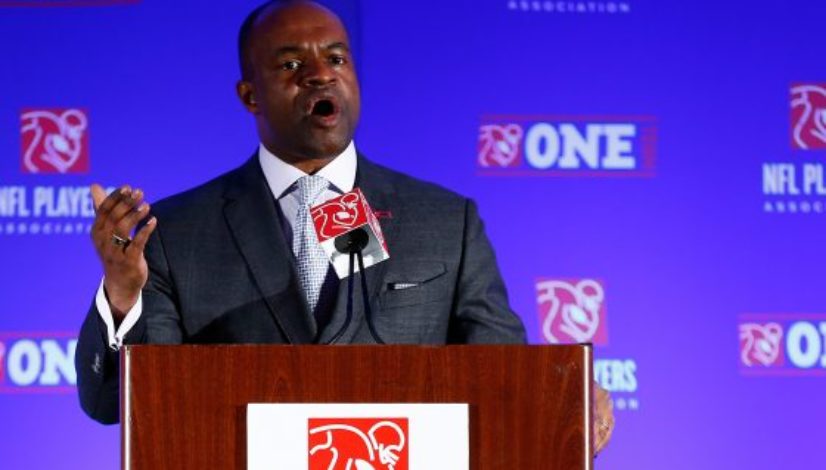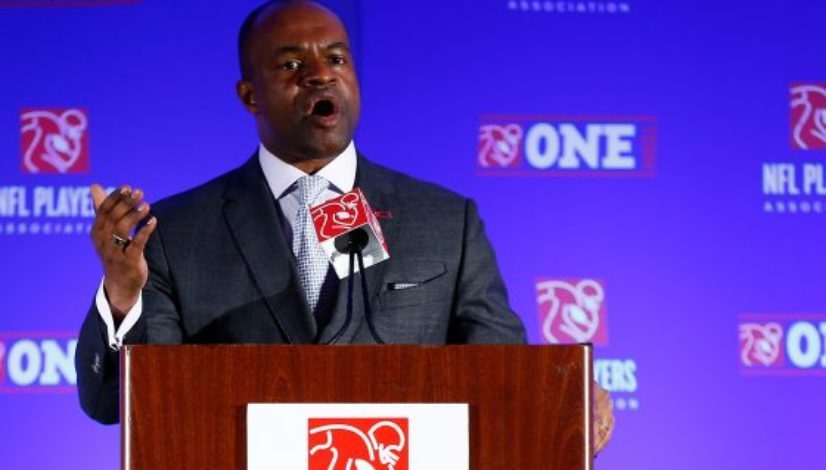NFLPA: Marijuana policy in NFL is “a CBA issue, not a law-enforcement issue”

Published: Feb 24, 2017, 4:39 pm • Updated: Feb 27, 2017, 7:36 am
By Nicki Jhabvala, The Denver Post
Despite recent comments from White House press secretary Sean Spicer about “greater enforcement” of federal recreational marijuana laws in states that have legalized its sale and consumption, the NFL Players’ Association said it will continue to push for its proposal of a “less punitive” marijuana policy because it’s “a (collective bargaining agreement) issue, not a law-enforcement issue” for the NFL.
“We are talking about how players get treatment under our jointly agreed upon drug policies, not any advocacy for Federal vs. State statutes,” George Atallah, the NFLPA’s assistant executive director for external affairs, told The Denver Post.
The NFLPA announced earlier this year that it hoped to present to the NFL an altered drug policy, to reflect the changing legal landscape and to provide players safer alternatives when treating pain.
On Thursday, Spicer set off alarm bells when he said: “There’s a big difference between (medical marijuana) and recreational marijuana, and I think when you see something like the opioid addiction crisis blossoming in so many states around this country, the last thing we should be doing is encouraging people. There is still a federal law that we need to abide by in terms of recreational marijuana and other drugs of that nature.”
Medical marijuana is legal in 28 states, as well as Puerto Rico, Guam and Washington, D.C. Recreational marijuana is legal in eight states, including Colorado.
But cannabis remains a federally illegal substance, classified as a Schedule I drug by the Drug Enforcement Administration “with no currently accepted medical use and a high potential for abuse.”
Per the NFL’s drug policy that was last updated in 2014, players are tested once in the offseason for substance-abuse drugs and are banned from having more than 35 nanograms per milliliter of urine of tetrahydrocannabinol (THC) in their system. (THC is what gets users high.) Players who test positive are entered into an intervention program that can lead to hefty fines and/or suspensions for future violations.
With only a 16-game schedule and non-guaranteed contracts, the NFL has one of the most stringent policies for marijuana use among pro sports organizations. The NHL, by comparison, doesn’t test for marijuana.
Over the last year many former and current NFL players have pushed for league acceptance of marijuana as well as cannabidiol (CBD), a compound in cannabis that has trace levels of THC but is believed to reduce pain and inflammation.
Although the NFLPA did not specify what “less punitive” means — they could raise the THC limit, allow therapeutic use exemptions for marijuana, reduce fine amounts and suspensions, stop testing altogether, etc. — it planned to review the topic at its annual meeting in March and, if approved by the executive committee, the new proposal would be presented to the league. Any change must be collectively bargained by the players and owners.
The NFLPA recently developed a pain management committee to assess player injuries and general wellness and to determine if there are safer but effective treatment options. Marijuana use is just one item on its long list of issues it is addressing.
“We want to look at the issue of pain comprehensively. We want to look at the issue of opioids, but we also want to make sure we’re looking at the issue of how and to what extent players may be self-medicating if they can’t get medication elsewhere,” NFLPA executive director DeMaurice Smith said during Super Bowl LI week in Houston. “As a subset of the Mackey-White Committee, we will be looking and asking the people who have looked and researched the issue of cannabis: Are there legitimate medical uses? Under what circumstances could they be used? And what circumstances may it make sense that this union would support a therapeutic use exemption? We’re not there yet. We’re looking at the issue comprehensively when it comes to medical marijuana, but we’re looking at it as an issue of pain.”
This story was first published on DenverPost.com
Topics: cannabidiol, cbd, drug testing, NFL, nfl drug policy, nfl players




